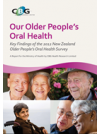The 2012 New Zealand Older People’s Oral Health Survey is part of the ‘Study into Older People’s Oral Health Issues’; an umbrella project funded by the Ministry of Health, specifically designed to supplement the findings of the 2009 New Zealand Oral Health Survey.
This report presents the key findings of the face-to-face interviews and dental examinations undertaken in the 2012 survey. The fieldwork (including the pilot study) was carried out from April to December 2012.
Key Results
Overall, 2218 New Zealanders aged 65 years and over participated in the face-to-face interview, and 1882 completed an oral health examination. The sample included 226 Māori, 141 Pacific peoples, 76 Asian people and 1813 European/Other older adults. Of the entire sample, 1120 (50.5%) were living in residential aged-care facilities, and 1098 (49.5%) were living in their own homes receiving home-based personal care assistance.
The report shows that a substantial proportion of the vulnerable older adult population in New Zealand has retained at least one natural tooth. Although this is an encouraging finding, as the retention of natural teeth benefits people’s overall health and wellbeing, the data also indicates that many dentate vulnerable older adults experience a significant burden of oral disease and unmet treatment need.
In addition, there are disparities in oral health within this population group, particularly among Māori and Pacific older adults, older adults of lower socioeconomic status, and those living in residential aged-care facilities.

